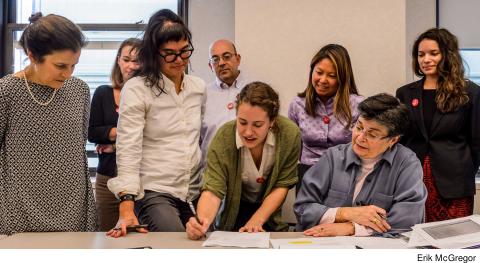Surveying members, delivering on demands
 |
The nearly 100 PSC members at the CUNY Research Foundation’s (RF) central office are able to celebrate a solid new contract as the end of the year approaches. The bargaining unit ratified a five-year contract on November 10, a month and a half before its expiration date, with 2 percent minimum annual wage increases, as well as gains in other areas.
The 14-member bargaining team, elected by the members, began negotiating the new contract in May, after several months of surveying the unit about contract priorities. Members’ priorities included, in addition to fair wage increases, controlling their share of health insurance premiums, correcting inequities for employees hired in the last four years, and maximizing dependent-care leave.
SUPPORTING DEMANDS
The contract with the RF, a private entity under the law, was set to expire at the end of the year. Because the RF is a private nonprofit employer, the workers are covered by the National Labor Relations Act rather than the state’s Taylor Law, and workers have the legal right to strike or engage in other job actions. This round of bargaining, however, was a departure from previous contract struggles that met heavy management resistance and sometimes involved job actions, including a one-day strike five years ago.
Bargaining team member Keith Bonner compared negotiations in this round with the more contentious round of negotiations to achieve the last contract, where “management came at us like a pit bull.”
“The workers were in an uproar and morale was really low,” he said of the talks five years ago. “This time around, the negotiations were very respectful. The team spent a lot of time putting together data, getting the pulse of the membership to see what they wanted and that’s what we were able to deliver this time.”
RF workers are responsible for processing millions of dollars in grant funding won by CUNY faculty and staff.
Charles Chaung, a senior business systems analyst at the RF’s central office, stressed that the bargaining unit’s surveying of the membership’s priorities and costing out the unit’s contract proposal at the outset of negotiations was key to creating the positive negotiating environment that led to this contract.
“We did a lot of calculations and we were pretty open,” he said. “We gave management an estimated budget and what our proposals would cost, so we could see what policies they were against and see if their opposition was actually about the cost.”
Bonner suggested that the overarching themes of this new contract were equity and ensuring that workers got what they deserved. “It was about making sure people had a comfortable living,” he said. “We don’t want to be millionaires. We just want to live.”
In addition to the 2 percent per year minimum annual wage increases, a major economic gain was enhanced longevity increases for employees with less than 10 years of service, an improvement the unit has sought repeatedly in recent contracts.
The new contract also ends a two-tiered annual leave accrual system where newer employees carried over fewer leave days than veteran employees. “There should never be anything that’s two-tiered,” said Barbara Rose, a worker with 19 years at RF.
EXPANDED BENEFITS
All employees in the bargaining unit will benefit from expanded leave for the care of sick dependents. In the previous contract, workers could use five accrued sick leave days a year to take care of immediate family members who are ill. In a new side letter to the contract, workers can use up to 20 of their accrued sick days per year for that purpose.
Another important gain is that there are no increases to the share of employees’ health insurance premiums for the next five years. In prior contracts, the employee share had increased steadily, so that not only were premiums going up, but also their share was increasing. Arsenia Reilly-Collins, the PSC organizing coordinator who worked with the bargaining team, noted that a major contract priority for the members was controlling health-care costs. In a new benefit, workers will be entitled to a $250 annual reimbursement for non-cosmetic dental expenses not covered by insurance.
Dawn Sievers, who has worked at the RF for 32 years and participated in several rounds of bargaining, hit a less subtle note during the ratification. “This is the best contract I’ve seen,” she said. “There were no givebacks, no nothing.”

